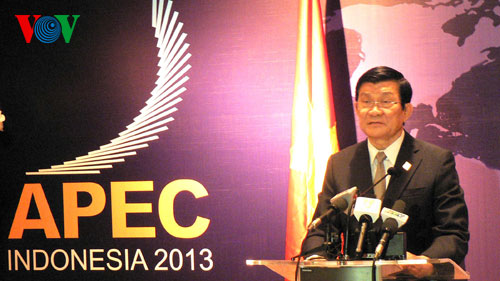Vietnam to host 25th APEC Summit in 2017
This is the second time Vietnam will host the event, following the first in 2006.
In his address at the Bali summit, President Truong Tan Sang noted the hosting demonstrates Vietnam’s resolve to realise its foreign policy of active international integration, its long-term vision for Asia and the Pacific, as well as its desire to make a responsible contribution to regional issues.
 |
He laid a strong emphasis on the dynamic development of the Asia-Pacific region, describing it as the global growth locomotive that houses most strategic and leading trade-economic partners of Vietnam.
He said actively joining and responsibly contributing to ASEAN, APEC and other cooperation mechanisms have enabled Vietnam to create a stable and peaceful environment and make full use of international resources for national development.
The integration process has also brought practical benefits to Vietnamese localities, business communities and people.
By hosting the 25th APEC Summit in 2017, he said Vietnam has a valuable chance to introduce the international community to a new and dynamic nation with huge potential for development.
This is also a chance for Vietnamese people to promote friendship with international friends, and for partners, businesses, and regional and international organisations to deepen their understanding of Vietnam’s glorious history, a traditional culture imbued with national identity, and specialities of all localities across the country.
President Sang stressed with self-confidence and creativity Vietnam will stand firm on its path to comprehensive integration.
APEC connectivity framework
Addressing an APEC working session on October 8, President Sang welcomed Indonesia’s APEC connectivity framework initiative, considering it the grouping’s first overall and long-term vision of connectivity to help attain the Bogor Goals and connect regional economies.
He proposed the APEC leaders assign relevant ministries to soon carry out the connectivity framework, with a focus on such practical areas as investment, infrastructure, transportation, information technology, labour, education, tourism, response to emergencies, and human resource development.
Sang also voiced his support for APEC’s long-term plan on development and investment in infrastructure, and proposed the plan should be put in place soon to optimise the involvement of the private sector in infrastructure development.
He said establishing connectivity networks is a long-term process, requiring the close coordination between economies and between cooperation mechanisms in the sub-regions, regions and inter-regions, citing the Master Plan on ASEAN Connectivity as an example.
He called on APEC to support ASEAN’s efforts to build a unified economic community by 2015, implement infrastructure projects, connect supply chains, facilitate trade, respond to global challenges and emergencies, maintain food security, and develop small- and medium-sized enterprises.
President Sang noted Vietnam prioritises strengthening linkages with other countries in the region, including within the Greater Mekong Subregion and the East-West Economic Corridor, so as to promote Southeast Asia’s potential and connect economies in the Asia-pacific region.
What the stars mean:
★ Poor ★ ★ Promising ★★★ Good ★★★★ Very good ★★★★★ Exceptional
Latest News
More News
- Foreign leaders extend congratulations to Party General Secretary To Lam (January 25, 2026 | 10:01)
- 14th National Party Congress wraps up with success (January 25, 2026 | 09:49)
- Congratulations from VFF Central Committee's int’l partners to 14th National Party Congress (January 25, 2026 | 09:46)
- 14th Party Central Committee unanimously elects To Lam as General Secretary (January 23, 2026 | 16:22)
- Worldwide congratulations underscore confidence in Vietnam’s 14th Party Congress (January 23, 2026 | 09:02)
- Political parties, organisations, int’l friends send congratulations to 14th National Party Congress (January 22, 2026 | 09:33)
- Press release on second working day of 14th National Party Congress (January 22, 2026 | 09:19)
- 14th National Party Congress: Japanese media highlight Vietnam’s growth targets (January 21, 2026 | 09:46)
- 14th National Party Congress: Driving force for Vietnam to continue renewal, innovation, breakthroughs (January 21, 2026 | 09:42)
- Vietnam remains spiritual support for progressive forces: Colombian party leader (January 21, 2026 | 08:00)
















 Mobile Version
Mobile Version